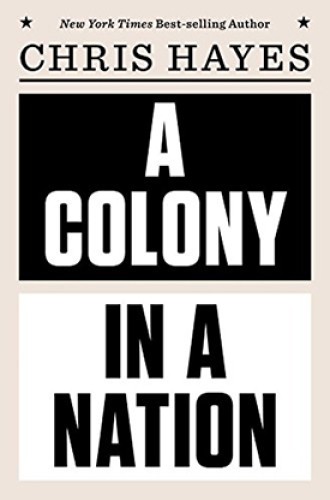Colonial Americans suffered under a two-tiered justice system. Later they created one.
Since before the revolution, punishment has depended on who’s being punished.
Everyone knows the United States has a broken justice system when it comes to race, right? Wrong, says MSNBC journalist Chris Hayes. We don’t have a problematic justice system. We have two justice systems—one for the colony and one for the nation—and they’re both broken. Our colony is not in some land far away: it exists within the nation. We have two classes of people, one with the rights of citizens and the other at the mercy of the whims of the state. And the lines are most clearly drawn along race.
It’s not a perfect theory and it would never pass a Ph.D. examination, but it’s bold enough to be quotable and instructive. Hayes, a skilled interviewer known more for his quick wit than his academic degrees, joins Rachel Maddow in the new class of journalists who are not afraid to venture into policy and give their own personal analysis of the news they cover, for better or worse.
Read our latest issue or browse back issues.
Hayes thinks the inequities in our country are nothing new. We are living out a pattern that began before we were a nation, and we drag our old colonial wounds and abuses into the present day with us. When America became a nation, revolutionaries made a colony of the slaves and their descendants, establishing a two-tiered justice system that continues to this day.
Hayes looks at the police shootings of African Americans in Baltimore, Chicago, and Ferguson, Missouri, and relates them to the way poor and hungry people were treated in colonial times. When the crown needed more revenue, it cracked down on smuggling, to which it had previously turned a blind eye. The British began harassing and humiliating merchants in the colonies. In response, those smugglers (or merchants, depending on your point of view) formed angry mobs to chase customs officers down the street, tarring and feathering them in outrage. There was widespread and violent conflict between the people who felt they could not get ahead in a two-class system that punished them simply for making a living and the clueless upper class and its representatives. John Hancock smuggled molasses in colonial America and railed against the system. Is he so different from Eric Garner, who was brutalized like a smuggler for selling cigarettes one at a time on a New York City sidewalk?
In the smash Broadway musical Hamilton, Britain’s King George sings to the American colonists: “You cry / In your tea which you hurl in the sea . . . / You’ll be back, soon you’ll see / You’ll remember you belong to me / You’ll be back, time will tell / You’ll remember that I served you well . . . / And when push comes to shove / I will send a fully armed battalion to remind you of my love!” It’s a hilarious moment in the musical because the audience knows that America won’t be back and King George is about to go down. We know that hundreds of years later Alexander Hamilton will be the hero, not King George.
But the genius of the song and dance number is this: in a sense, America did come back to King George. The new American state learned governance at the feet of the colonizers and regarded the establishment of law and order as an act of tough love.
Hayes sees movements like Black Lives Matter as analogous to the early American revolutionaries who protested the unfairness they faced in the colonies. As Hayes explains it, the colonists who rebelled weren’t sitting around drafting poetic political papers. They were trying to make a few bucks selling the things people wanted on the black market. Why were they treated like criminals while the colonial empire lived off their suffering? The British underestimated the pent-up humiliation in colonial society at their peril, and they were caught off guard when it erupted in rebellion.
As the crime waves of the 1960s to the 1990s invoked fear from Nixon to Reagan, words like order came to replace the older, explicitly racist words. But underneath the coded language are racial assumptions. There’s a cloak of deep suspicion attached to blackness, while whiteness is rarely viewed as a threat to social order.
Hayes demonstrates this reality with an anecdote from his own relatively privileged life as a white journalist. When he was covering the 2000 Republican national Convention, the police found his stash of marijuana as he was going through the security line. Not only did they let him pass, they even let him pick up the bag of drugs and take it with him. He was being treated as a member of the nation, where people aren’t punished for minor infractions. Had he been a member of the colony, it would have been very different.
Hayes wants us to look honestly and dispassionately at how we got here. Before we were the United States of America, we were a colony and a nation linked in a historic bargain that promised if we keep one side down, the other side will prosper into perpetuity. There is no more powerful experience in politics or history than humiliation, Hayes reminds us. No one wants to experience it again. The founding fathers didn’t do away with the colony, they just moved themselves out of it and gave themselves nation status. They then turned around and created their own colony within the nation, based on race, which persists to this day.







